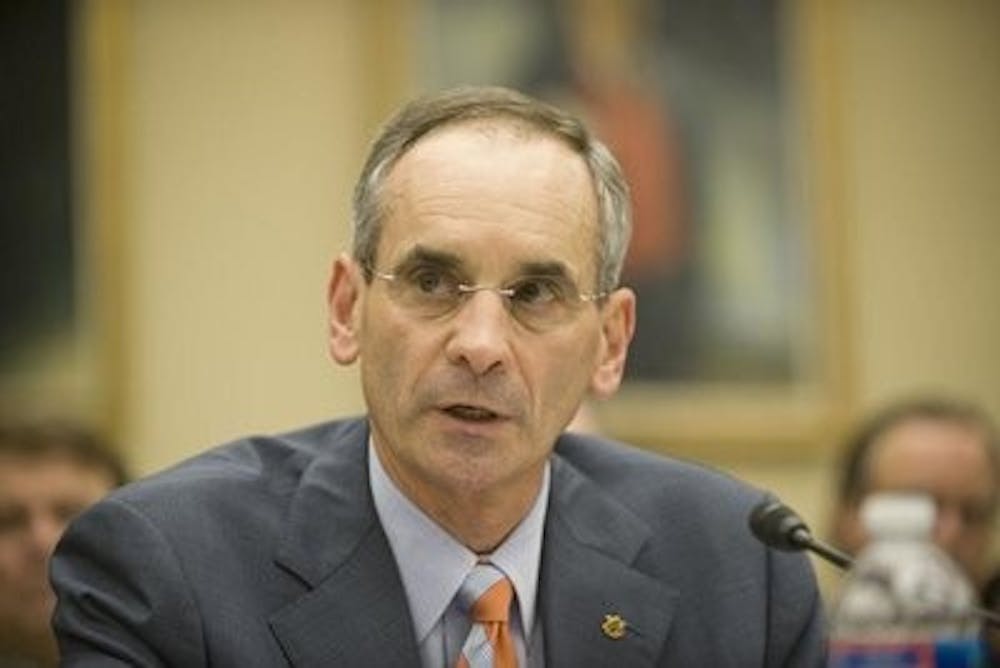Auburn University's Vice President of Research Dr. John Mason was invited to speak before a congressional subcommittee last week to testify about the impact and role of research universities in the United States.
Speaking before the Research and Science Education Subcommittee of the House Committee on Science, Space and Technology on Wednesday, June 27, Mason emphasized the vital role that research institutions play in national security and economic prosperity.
Mason was one of four university research vice presidents invited to testify, along with those from Duke University, the University of Arizona and Texas A&M University.
The hearing, titled "The Role of Research Universities in Securing America's Future Prosperity: Challenges and Expectations," followed up the release of the National Research Council's recent report on the state and future of America's research universities.
Mason's comments focused on Auburn's contributions to three types of national security: cyber, food and energy. Mason talked about the need to keep research a priority so that bright students want to pursue the challenging and difficult fields that the U.S. is slipping behind other countries in.
In closing, Mason said, "We at Auburn are confident that relevant fundamental research enables teaching and learning ... and we're confident that relevant fundamental research is the basis for prosperity and security."
The speakers were given five minutes to speak in front of the subcommittee and were also allowed to prepare a lengthier written statement to be published in the congressional record.
Director of Public Affairs Brian Keeter attended the hearing.
Keeter said barring abnormal circumstances or celebrity testimonies like this are usually not crowded.
Not this one, however.
"Every seat was taken," Keeter said. "There were even 15 or 20 people standing in the back."
According to Keeter, the last member of the Auburn faculty to testify before Congress was Dr. Steve Taylor. Taylor appeared in Washington in Feb. 2007 and spoke about biofuel research and engineering.
Representative Mo Brooks of Alabama's fifth district, which surrounds Huntsville, is chairman of the subcommittee that hosted last Wednesday's hearing. Brooks said he discussed the contributions of research institutions in remarks that opened the session.
"Particularly in today's tough economic times, research universities play a vital role in America's ability to maintain its competitiveness in an increasingly technologically developed world, and the knowledge and skills produced by our nation's research graduates provide the fuel for these endeavors," Brooks said.
Brooks' district is home to an Auburn research center in Huntsville that has had an important role in space and defense technology research.
Mason joined the University on Sept. 1, 2008 as the associate provost and vice president for research.
Mason is responsible for research program development, sponsored programs and technology transfer and commercialization.
He is also the president of the Auburn Research and Technology Foundation.
Mason's responsibilities include the research budget, personnel, federal compliance, economic development and federal legislative research related initiatives.
As vice president, Mason serves on the president's cabinet and provides leadership for strategic planning for the university research enterprise. As associate provost, Mason serves as the president's appointment to the University Promotion and Tenure Committee and the University Senate.
Before coming to Auburn, Mason was the associate dean of Graduate Studies, Research and Outreach in the College of Engineering at Pennsylvania State University. He was a tenured professor of civil engineering and had served as the director of the Thomas D. Larson Pennsylvania Transportation Institute and as the executive director for the Mid-Atlantic University Transportation Center.
Mason holds a B.S. degree in transportation from Pennsylvania State University, a M.S. in transportation engineering from Villanova University, and a Ph.D. in civil engineering from Texas A & M University.
Mason is also a registered professional engineer in Pennsylvania.
Do you like this story? The Plainsman doesn't accept money from tuition or student fees, and we don't charge a subscription fee. But you can donate to support The Plainsman.





